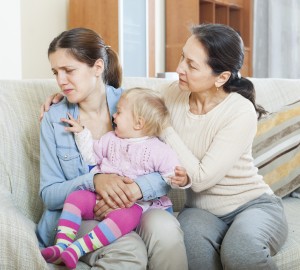In 2012, I undertook a study of mothers visiting our surgery and we assessed their emotional wellbeing. The results of this study were published in the British Medical Journal (Open).
We assessed 100 mothers using a recognised survey tool called DASS 21. This is a questionnaire designed to assess depression, anxiety and stress. For mothers visiting us for the first time, where they were requesting help because their child had an established sleep problem, and where the child was between six to 12 months of age, their scores for any degree of depression, anxiety or stress were measured.
We also recorded the average number of night time awakenings. It was 5.0 per night.
The scores clearly reflected the impact of coping with disturbed sleep for six to 12 months.
Depression (any severity) 32.5%
Anxiety (any severity) 25%
Stress (any severity) 48.8%
After the first visit, the mothers returned approximately two weeks later and were re-surveyed. At this point the only intervention received by those mothers was the basic guidance on the physiology of infant sleep and advice on how to resolve the overnight sleep problems, that forms the foundation of The Babysleep Doctor strategy.
The average number of night-time awakenings had dropped from 5.0 to 0.5 by the time of the second visit.
Scores for the second survey were as follows:
Depression (any severity) 5% Improvement of 85%
Anxiety (any severity) 15% Improvement of 40%
Stress (any severity) 20% Improvement of 59%
These results are consistent with my clinical observations. It is self-evident, in a clinical sense, and this is now supported by the above evidence, that once sleep disruption is resolved, the wellbeing of the mother improves dramatically and rapidly.
In addition to the above validated scores for depression, anxiety and stress I use an internal scoring system that looks at the mother’s self-perception for self-confidence, her pleasure in being a mother and her level of frustration with her baby. These scores improve dramatically and consistently once sleep disruption is resolved.
Why is postnatal depression so significant?
It is estimated that 10 to 20% of women experience postnatal depression1 while others experience emotional problems that, while less severe than clinical depression, may still negatively impact upon maternal well-being2,3. Not only is depression a major health problem for mothers, but it can have serious and long-term detrimental effects on family well-being and stability, and upon the cognitive and emotional development of children4-6. In addition, short sleep duration in early infancy can directly affect children’s behavioural competence, emotional well-being, cognitive performance and physical development, including the risk of becoming overweight7.
Sleep problems in early infancy may contribute to postnatal depression and maternal anxiety. Approximately one third of Australian parents report sleep difficulties in babies between the ages of one to 24 months8. Between the ages of six to 12 months, this figure has been reported to be as high as 46%3.
The Babysleep Doctor has demonstrated that our sleep strategies are an effective means of improving babies’ sleep duration, including average hours of day, night, and total sleep, without an increase in crying9 At 12 weeks of age, children who received our intervention averaged nearly 15 hours more sleep per week, compared to the children who did not receive our intervention9. The same single sleep behaviour consultation also reduced levels of maternal depression, anxiety and stress10. In our study, 32% of mothers tested positively for mild, moderate, severe or very severe depression prior to their first consultation. At the second consultation, this figure had decreased to 5%, with similar results for anxiety and stress. Most importantly, the numbers of women in the severe/extremely severe categories for depression, anxiety and stress at the first consultation, were all reduced at second consultation.
It is well established that the detrimental impacts of postnatal depression extend beyond the parent to the child. Deficits in early interactions and cognitive functioning, insecure infant attachment, and behavioural disturbances, including more aggressive behaviours and violence, have been associated with postnatal depression6,11.
An effective intervention which can improve sleep behaviour in children, and subsequently symptoms of depression in mothers, may have short- and long-term benefit for not only mothers, but children also. The Babysleep Doctor strategy promotes the development of good sleep habits by putting babies and children to sleep awake and without parental intervention7.
Conclusions:
- Postnatal depression is a condition of significance that must be treated with respect and sympathy.
- It is common in our culture and is associated with significant consequences for families.
- It is my experience, both clinically and through my peer-reviewed published research, that we can decrease postnatal depression, anxiety and stress.
- It is my clear experience that if the strategies described in this book are commenced before or shortly after birth and are continued, that the development of these problems is largely avoided.
References
- Ohara MW, Swain AM. Rates and risk of postpartum depression – A meta-analysis. Int Rev Psychiatry 1996, 8(1): 37-54.
- Brown S, Lumley J. Maternal health after childbirth: results of an Australian population based survey. BJOG 1998, 105(2): 156-161.
- Hiscock H, Wake M. Infant sleep problems and postnatal depression: A community-based study. Pediatrics 2001, 107(6): 1317-1322.
- Beck CT. The effects of postpartum depression on child development: A meta-analysis. Arch Psychiatr Nurs 1998, 12(1): 12-20.
- Cogill SR, Caplan HL, Alexandra H, Robson KM, Kumar R. Impact of maternal postnatal depression on cognitive development of young children BMJ 1986, 292(6529): 1165-1167.
- Murray L, Cooper PJ. The impact of postpartum depression on child development. Int Rev Psychiatry 1996, 8(1): 55-63.
- Touchette E, Petit D, Tremblay RE, Montplaisir JY. Risk factors and consequences of early childhood dyssomnias: New perspectives. Sleep Med Rev 2009, 13(5): 355-361.
- Armstrong KL, Quinn RA, Dadds MR. The sleep patterns of normal children Med J Aust 1994, 161(3): 202-206.
- Symon B, Marley J, Martin A, Norman E. Effect of a consultation teaching behaviour modification on sleep performance in infants: a randomised controlled trial. Med J Aust 2005, 182(5): 215-218.
- Symon B, Bammann M, Crichton G, Lowings C, Tucsok J. Reducing postnatal depression, anxiety and stress using an infant sleep intervention. BMJ Open 2012, 2(5).
- Hay DF, Pawlby S, Angold A, Harold GT, Sharp D. Pathways to violence in the children of mothers who were depressed postpartum. Dev Psychol 2003, 39(6): 1083-1094.

















